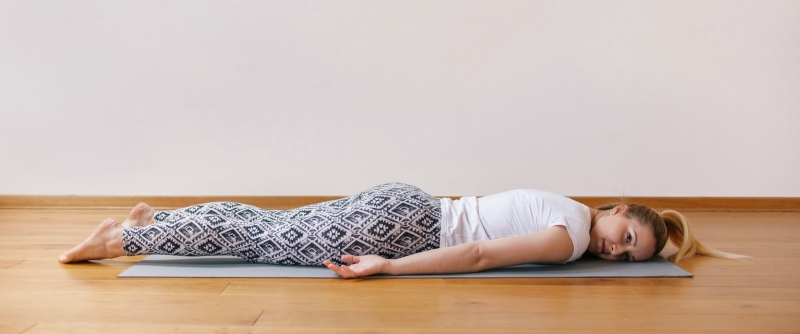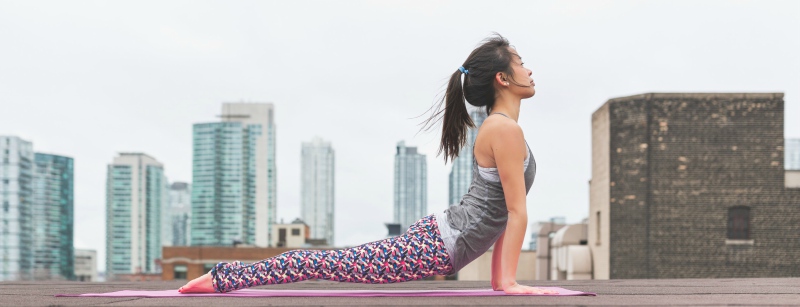 Yoga can play an important role for women who suffer from depression. But how do you encourage them to do start practising at home? Nina Vollbehr, psychologist, and her team set up an online module with yoga exercises and home assignments. The perfect combination, she says
Yoga can play an important role for women who suffer from depression. But how do you encourage them to do start practising at home? Nina Vollbehr, psychologist, and her team set up an online module with yoga exercises and home assignments. The perfect combination, she says
“In 2014, we developed a yoga module, a 9-week training session for women aged 18 to 34 who suffer from anxiety and depression. This was a psychological intervention that teaches participants to use yoga exercises to worry less, to be kinder to themselves and to deal with negative emotions differently. We offered this training at the mental healthcare centre within the framework of a study.” As she developed the module, Vollbehr thought about how she would like participants to do their exercises. “You want to encourage them and make it easy for them to exercise. I already knew that during mindfulness training sessions, CDs with spoken instructions were used and that they were handed out to participants.”
Yoga and depression: connecting body and mind
During her psychology studies, Vollbehr became interested in interventions that focus not just on behaviour and thoughts but that also involve our body and emotions. At the time, Vollbehr was practising yoga and she lived in a yoga centre for a couple of months. Slowly, she developed the idea of uniting yoga and psychology. “To me, yoga is a way of connecting with all sorts of experiences within yourself, your body, your breathing, your thoughts and emotions. By observing them, you can teach yourself to shift your attention and to approach yourself in a friendlier way. Something that will come in handy for this group of women.”
From yoga videos to ehealth
Vollbehr decided to make her own videos, like the ones she had seen during the mindfulness training sessions. “Initially, they were really makeshift, simply to give participants something they could use at home.” She recorded the exercises and the videos and posted them on a closed YouTube channel so that only module participants could watch them. There was also a more permanent thought behind this. “I didn’t want to burn DVDs or print off instructions. And also, a lot of people use their mobiles or tablets for all sorts of things these days. So we made it easy for them.”
"If I worry about something, it goes around and around in my head or I get stressed. Now, I’m more aware of myself and certain thoughts.” - participant
It was Nina Vollbehr’s first experience with ehealth. “The first group got into the training really well, practising at home using the videos. The results were promising and participants noticed a difference.” Her study caught attention when she attended a conference of the American Psychological Association. “A press release had been sent out beforehand, with information about projects relating to yoga and depression and we were named as well. Before I knew it, we were doing interviews and being quoted in the media.” It culminated in an interview on Sky News, for an item on the subject.
Low-threshold
At the time, the mental health organisation where Vollbehr works started a collaboration with Minddistrict and ehealth was an increasingly popular subject of discussion. “I wanted to know more about it because this is a fantastic way of letting people do things in a low-threshold way. Exercises are easier to integrate into our daily lives because everyone logs on several times a day.”
An online module is now available and the videos are made by a professional. The training consists of nine weekly sessions during which participants learn how to do their exercises. They then go home to work on their assignments and on the exercises they have learned. The programme is intended for young women who have hardly any or no experience with yoga. “We've got a different theme every week. The online module consists of psycho-education and the participants work on registration assignments at home. We also have videos they can use. As a trainer, I can follow them online, I can see what they do and give feedback. That works really well.”

The assignments vary greatly. “One theme may be about self-care and the assignment would be to do something every day that would constitute care for yourself. Participants have to write down how the exercise went and when they did it. I can see what they've done and guide them.” In addition to the online module, there are weekly group gatherings during which they mainly practise yoga. “The further integration and practising take place at home, via the online module.”
Referred to online yoga module
The online module does require a certain degree of discipline from participants, Vollbehr confirms. “I think about half of them get on with it well, a quarter practise less regularly and the other quarter ultimately don’t do a lot with it.” The participants were referred and are not obliged to take part. “Also, not everyone who suffers from depression finds it as easy to start exercising. But my experience is that a large group really want to take part in this.”
“Yoga taught me to listen to my intuition, and not to be afraid to find and learn about my own limits. The online training taught me a lot about myself and it made me think.” - participant
Yoga as mental health treatment, not for relaxation
Yoga is physical exercise so that does require supervision, Vollbehr emphasises. “The training we’ve developed can also be seen as healthcare treatment, so not just as yoga for relaxation purposes.” It concerns specialist mental healthcare for women who have been diagnosed with depression. “They learn to find their limits. We see that a lot among women who suffer from depression. They sometimes find it difficult to accept and respect their physical limits. Others find it harder to get going and for them, a meeting is more suitable.”
Results
After a year, there are 63 women who participate in the online module. “We’re aiming for a total of 170 participants. We want to continue this into next year. At the end of 2019, we should have collated all the results, including a follow-up after half a year and a year.”
Vollbehr is already convinced of the value of an online programme. “It’s an interesting intervention for our target group. By doing exercises with the aid of the videos, the subject matter becomes a bit more in-depth. The more you practise, the easier it gets.” The online element also ensures the content is more accessible and available on all of today's devices within a second. “Participants feel it enhances their experience, they feel they get more out of it and that they’re now able to integrate the applications in their lives.”
More information?
Do you want to know more about ehealth research? Then take a look at:
- the interview with Ina Beintner about online prevention of eating disorders
- this article about prof. dr. Ed Watkins's reasearch in digital worry therapy
- our interview with professor Frank Snoek, about diabetes and ehealth
Do you want to discuss this article with us, or do you have other questions? Don't hesitate to contact us!
